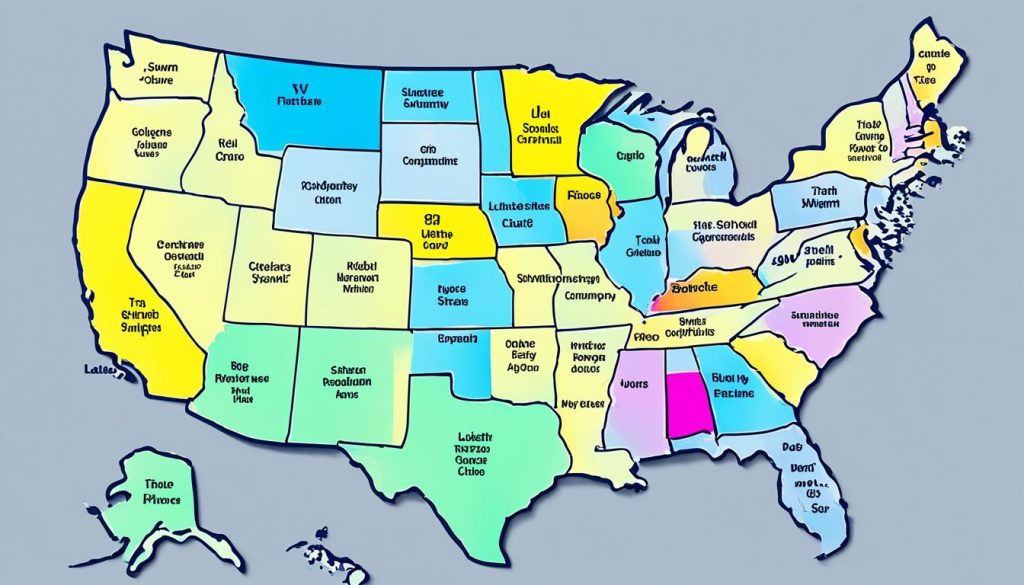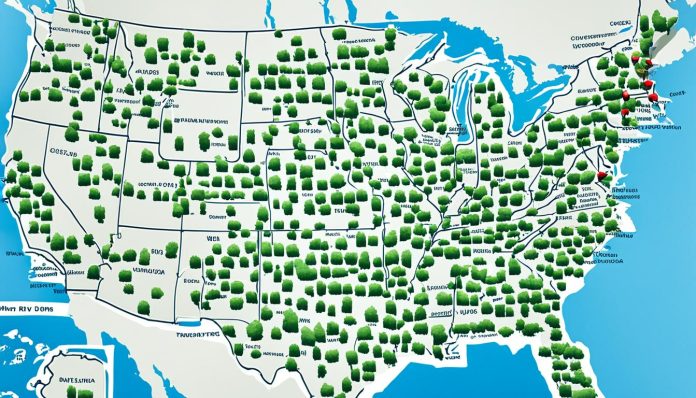Many adventure-seekers love traveling in a travel trailer across the U.S. Yet, laws differ widely from state to state. It’s important to know where it’s legal to ride in a travel trailer. This ensures you follow local rules and stay safe on your journey.
Before you head out with a travel trailer, it’s key to know where you can have passengers inside. This info makes your trip legally sound and safe for everyone. Some states allow this under certain strict rules. So, it’s important to be well-prepared and know the laws about travel trailers.
Traveling in a trailer gives a comfortable and convenient way to see the country. But, rules can be quite different from one state to another. That’s why it’s crucial to get updated and accurate info before hitting the road. This helps you plan your trip according to each state’s specific regulations.
Key Takeaways
- Verify the legality of riding in a travel trailer before traveling, as regulations vary by state.
- Ensure compliance with state-specific laws to avoid penalties and ensure passenger safety.
- Riding in a travel trailer is allowed under certain conditions in multiple states, requiring thorough knowledge of these stipulations.
- Familiarizing oneself with each state’s regulations enhances travel planning and route selection.
- Constantly update your knowledge about the states that permit riding in travel trailers, as laws can evolve.
Understanding the Legalities of Passenger Travel in RVs
Traveling in an RV means knowing the laws of the road. You need to understand the rules of where you’re going. This helps make sure your trip is safe and legal.
State-by-State Breakdown of RV Passenger Laws
Every state has its own rules for RV passengers. These laws affect how to plan your trip. It’s important to know them to keep everyone safe and avoid trouble.
Contrasting Rules for Fifth Wheels and Travel Trailers
Fifth wheels and travel trailers have different rules. Fifth wheels might be more stable and offer more room. This can impact how safe and comfortable your trip is.
Communication and Safety Requirements
Good communication and safety gear are a must in RVs. Having the right communication tools and safety equipment is key. They help keep everyone safe, especially during emergencies.
| Feature | Fifth Wheel | Travel Trailer |
|---|---|---|
| Stability | High | Medium |
| Space | More Spacious | Less Spacious |
| Safety Regulations | Stricter | Less Strict |
| Recommended Use | Longer Journeys | Shorter Trips |
Knowing about RV travel laws and differences between RV types is crucial. It’s essential for all RV travelers. This includes both short trips and long adventures.
What States Can You Ride in a Travel Trailer
In the United States, rules on riding in a travel trailer differ from state to state. This shows the mix of laws and the need to keep everyone safe. It underlines the need to follow guidelines for those in a travel trailer.
State-by-State Breakdown of RV Passenger Laws
Figuring out which states allow travel trailer passengers is tricky. Each state has its own set of rules. For example, California, Oregon, and Arizona let you ride in a trailer with certain safety measures and communication steps.
Contrasting Rules for Fifth Wheels and Travel Trailers
The rules for fifth wheels and travel trailers are not the same. Fifth wheels are seen as more stable by some states. They have better safety features. This makes it easier for them to pass regulations versus travel trailers.
Communication and Safety Requirements for Riding in a Travel Trailer
Safety and communication are key when traveling in a trailer. It’s crucial for the trailer to have working radios. Plus, everyone should be able to use safety tools, like fire extinguishers and carbon monoxide detectors.

Tips for Ensuring Safe Travel in Various States
To travel safely in different states, plan carefully and follow local rules. If you’re experienced or just starting with RVs, a few tips will make your trip safer. The first key tip is to plan your trip well. Look up your route beforehand for any travel alerts or laws you should know.
This step will help avoid problems and prepare you for the new states’ roads and traffic. Also, keep your RV well-maintained. Check the tires, brakes, lights, and engine before you go. This check is important for safety and your vehicle’s health, especially on rough terrains in different states.
Always carry an emergency kit. It should have first aid, tools for repairs, extra water and food, and a list of emergency contacts. And remember, following traffic rules is critical. Everyone in the RV should know what to do in emergencies. Plus, knowing how to use the safety and communication gear onboard is a must.
With good precautions and planning, your RV trip can be fun and safe. Remember these tips for your next adventure. They will help you have a smoother and safer journey.












































